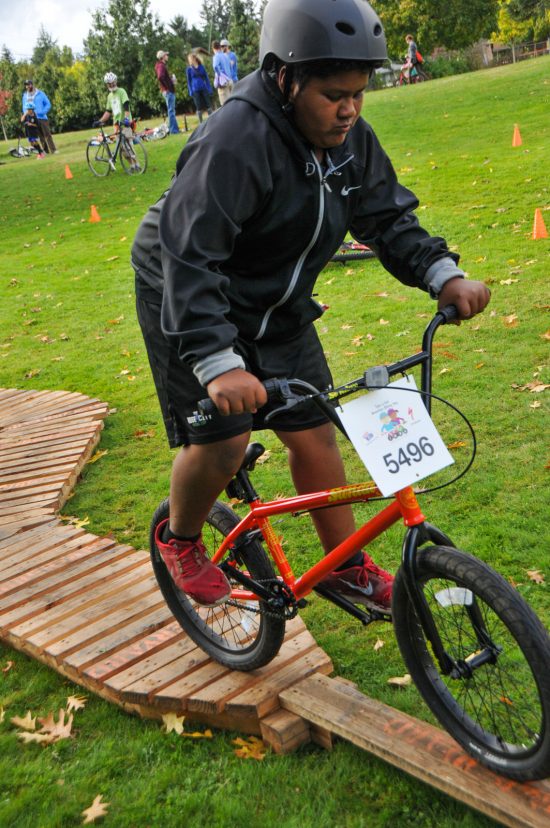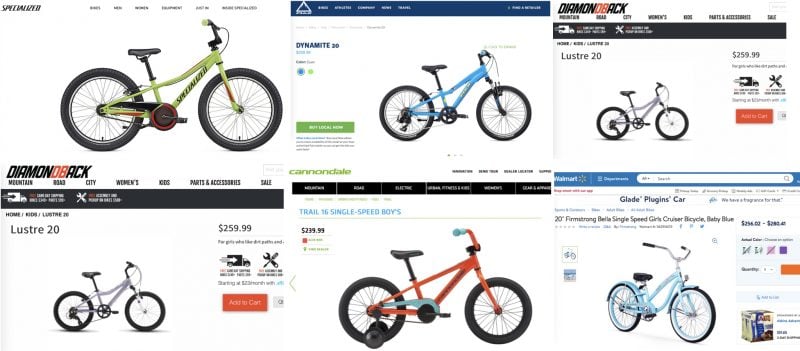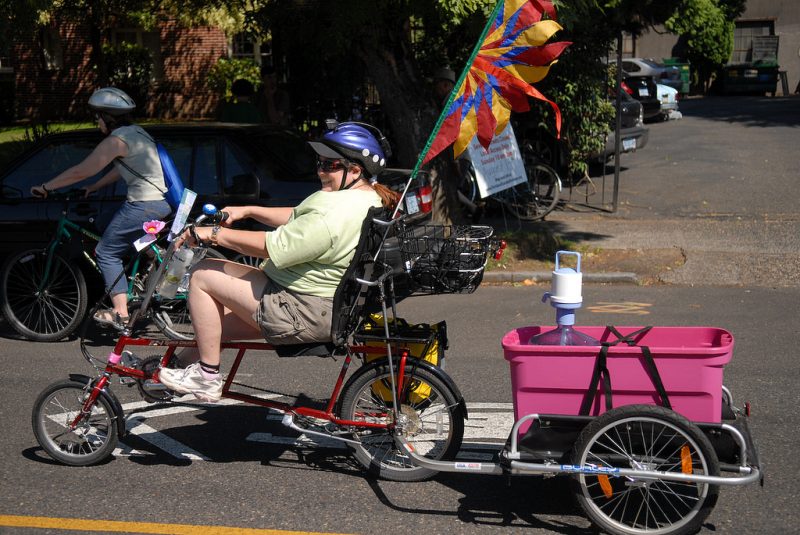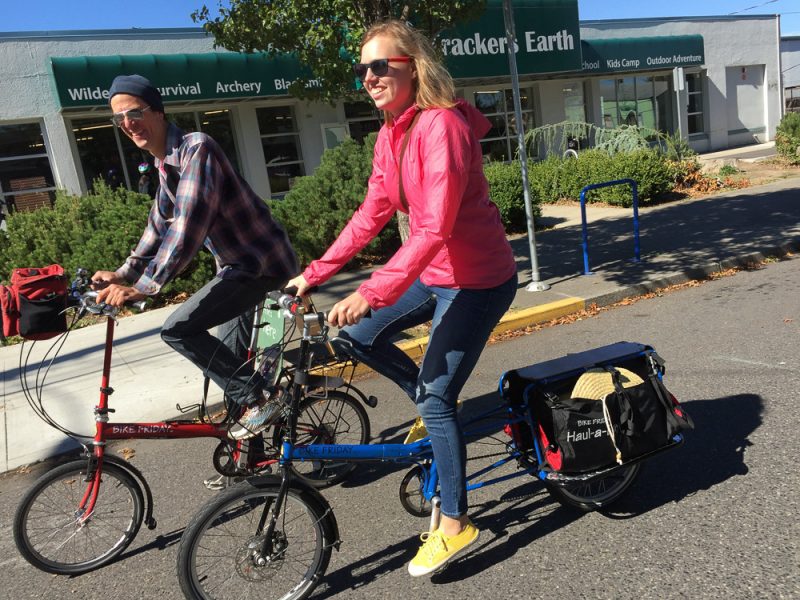
(Photo: J. Maus/BikePortland)
The Oregon Legislature is considering dozens of changes to the major transportation bill they passed last year. Among them are two substantive changes to the $15 bike tax.
The Oregon Department of Revenue (DOR) thinks the existing tax is too complicated and they want to make sure it captures as many bicycles as possible.
In a nutshell, if House Bill 4059 is signed by Governor Brown, the tax will apply to more bicycles than before. The proposal has caught the ire of national bike industry leaders who have written a letter to lawmakers opposing the idea.

As currently written, “taxable bicycle” is defined as a bicycle with a wheel diameter of 26-inches or larger (so as not to tax children’s bikes) and a retail price of $200 or more. DOR’s proposal would drop the wheel-size stipulation from the definition and the tax would then apply to all bikes over $200.
“There are a whole bunch of adult and kids bikes you can buy for under $200.”
— Senator Lee Beyer, committee co-chair
DOR has also requested that the definition of “bicycle” explicitly includes electric assisted bicycles (by striking the phrase “propelled exclusively by human power”) so that e-bikes can be charged the tax as well. The change to the e-bike definition would also fix the confusion with the vehicle privilege tax. (Because of a quirk in the existing bike tax law, buyers of electric-assist bikes must pay the “vehicle privilege tax” of 0.5 percent of the purchase price. However the law only applies to e-bikes sold at certified automobile dealers — and since most e-bikes are sold at bike shops, they are currently exempt.)
The Joint Committee on Transportation is debating these changes in House Bill 4059. Committee Administrator Patrick Brennan addressed the confusion over the bicycle wheel sizes at a public hearing on February 12th.
“The tax was designed to exclude children’s bicycles,” he said. “However, bicycles come in all sorts of shapes and sizes… Some bicycles have one big wheel and one small wheel and the existing law says ‘two wheels’ of a certain size.” To clear this up, Brennan explained to committee members that the “simplest solution” would be to just remove all references to wheel size entirely. “Just say the excise tax applies to all bicycles over $200. Period. Regardless of wheel size.”
Advertisement

Senator Betsy Johnson then asked the committee what kids bikes cost these days. “About $100 bucks” committee Co-Chair Lee Beyer replied. “There are a whole bunch of adult and kids bikes you can buy for under $200,” he added. “That seems to be a benchmark.”
Xann Culver with the Department of Revenue testified that, “Limiting it to just the dollar amount would be much more clear to the bicycle retailers as to which bicycles would be subject to the tax.”
The bike industry supports the change in how e-bikes are handled; but they oppose the expansion of the bike tax to all wheel sizes.
In a letter dated February 21st, the Director of State and Local Policy for the PeopleForBikes Coalition Alex Logemann, National Bicycle Dealers Association Board Chair Brandee Lepak, and Bicycle Product Suppliers Association President Adam Micklin urged Committee members to maintain the 26-inch wheel diameter requirement.
“Our objection to altering the minimum wheel size requirement is premised on two issues,” they wrote, “1) the new bicycles that will be subject to taxation will primarily be children’s bikes; and 2) it will place an additional burden on bicycle shops that have already invested resources to comply with the tax.”
These bicycle industry experts say the existing tax leaves out only some children’s bikes, folding bikes, BMX bikes, and some recumbents. In total, these, “make up an exceedingly small portion of the bicycle market” and have a much larger impact on bikes ridden by children and teens. “Eliminating the minimum wheel diameter requirement will subject very few bicycles used by adults to taxation, and many more bicycles used by children to taxation,” they wrote.
Here’s a longer excerpt from their letter:
The elimination of the 26 inch wheel diameter requirement in the existing statute will undermine the Committee’s objective of ensuring that bicycles ridden by kids are not subject to the bicycle excise tax. Discussion at the February 11th hearing indicated that many members believe that children’s bicycles rarely meet or exceed a $200 retail price. This is simply not true. We have included examples of children’s bicycles that retail for more than $200 from some of the most popular brands on the market to demonstrate that children’s bicycles are commonly priced between $200 and $350. These bicycles all have wheel diameters between 12 inches and 24 inches, and they only avoid being subject to the bicycle excise tax due to the minimum wheel diameter requirement in existing law. If the statute is amended to remove the minimum wheel diameter requirement, the primary effect will be to tax more of these children’s bicycles.
Beyond the issue of which bicycles would be subject to the tax if the minimum wheel size requirement were to be eliminated, we question amending the tax after bicycle retailers have diligently worked to align their inventory and point of sale systems to the requirements of the bicycle tax. Relying on the statute, retailers have made substantial investments in efforts to comply with requirements of tax. Mandating that these businesses go back and make changes to these procedures, only two months after the tax has been implemented, will be a burden.
The bike tax is expected to raise about $1.2 million per year with funds going into the Connect Oregon grant program where they’ll be spent on “off-highway” paths.
The Joint Committee has not taken a formal vote on the amendments and no further public meetings have been scheduled. A work session has been scheduled for Wednesday February 28th at 5:30 pm in Hearing Room D. You can find contact information for committee members here.
UPDATE, 2/28: We’ve heard back from Tim Goodall, managing director at Islabikes, a children’s bike maker based in Portland:
“At a time when childhood obesity is at an all-time high in the US, a trend that’s showing no signs of reversing, it’s extremely disappointing that children’s cycling is being specifically targeted through taxation. We’d much rather see higher corporate taxes than punitive taxation of children’s bicycles.
Of course, this tax will impact Islabikes as now every bike we sell to Oregon residents will be taxed. This will increase our administrative costs when there are already multiple ways to generate state income via business taxes.
More importantly, we’re penalizing an activity we should be incentivizing for the benefit of our children’s health.”
— Jonathan Maus: (503) 706-8804, @jonathan_maus on Twitter and jonathan@bikeportland.org
Never miss a story. Sign-up for the daily BP Headlines email.
BikePortland needs your support.



